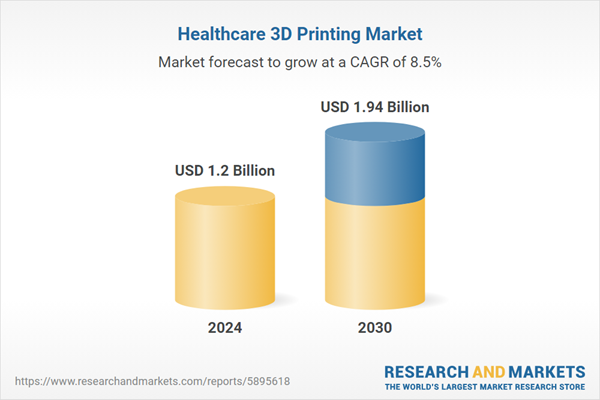Speak directly to the analyst to clarify any post sales queries you may have.
10% Free customizationThis report comes with 10% free customization, enabling you to add data that meets your specific business needs.
This technology enables precise fabrication of patient-specific implants, prosthetics, anatomical models, and other medical devices, improving surgical accuracy, recovery outcomes, and affordability. A notable example includes the transformative use of 3D-printed anatomical models in preoperative planning, allowing surgeons to rehearse complex procedures. The technology's capability to deliver tailored prosthetics and implants is particularly beneficial in orthopedics, dental care, and reconstructive surgery. As 3D printing continues to gain traction across clinical and research settings, its applications are expanding, supported by growing demand for personalized medical solutions, technological advancements, and the push toward cost-effective, patient-centered care.
Key Market Drivers
Rising Aging Population
The global rise in the aging population is a major driver for the Healthcare 3D Printing Market. According to WHO 2024 data, by 2050, 80% of older adults will reside in low- and middle-income countries, with the population aged 60 and over nearly doubling from 12% to 22%. This demographic shift is generating increased demand for customized medical solutions, particularly for conditions associated with aging such as joint degeneration and dental deterioration. 3D printing enables rapid production of implants, prosthetics, and assistive devices tailored to the elderly, enhancing comfort, performance, and recovery. Furthermore, the potential for bioprinting of tissues and organs aligns with long-term healthcare needs of aging individuals, establishing this population segment as a key growth catalyst for the market.Key Market Challenges
Material Limitations
Material limitations remain a significant challenge for the Healthcare 3D Printing Market. Producing safe, functional, and biocompatible 3D-printed medical products requires materials that meet strict clinical standards. Issues such as biocompatibility, sterilization compatibility, and mechanical strength often limit the range of materials suitable for human use.Many existing 3D printing materials cannot endure common sterilization methods, affecting their use in surgical or implantable devices. Additionally, some materials lack the mechanical properties necessary for long-term durability inside the body. These limitations restrict broader application and adoption, particularly in critical care or implant-based uses. Continuous R&D efforts are underway to expand the available material options, but resolving these technical constraints remains complex and resource-intensive.
Key Market Trends
Telemedicine Integration
The integration of telemedicine into healthcare 3D printing is an emerging trend reshaping service delivery models. As digital health adoption rises - particularly since the COVID-19 pandemic - 3D printing is being incorporated into remote care strategies. Clinicians can remotely evaluate patient needs and transmit digital designs for customized medical devices, such as orthopedic implants or prosthetics, to nearby 3D printing facilities. This model accelerates device delivery and improves access to personalized care, especially in underserved or remote areas. By aligning with telehealth platforms, 3D printing providers can offer on-demand, patient-specific solutions while reducing in-person interactions. This synergy enhances convenience, supports decentralized care, and presents new growth opportunities for both industries.Key Market Players
- Bio-Rad Laboratories
- Guardant Health Inc.
- Illumina, Inc.
- Qiagen NV
- Laboratory Corporation of America Holdings
- F. Hoffmann-La Roche AG
- Thermo Fisher Scientific Inc.
- Johnson & Johnson
- Biocept Inc.
- Bio-Rad Laboratories, Inc.
Report Scope:
In this report, the Global Healthcare 3D Printing Market has been segmented into the following categories, in addition to the industry trends which have also been detailed below:Healthcare 3D Printing Market, By Technology:
- Stereo Lithography
- Deposition Modeling
- Electron Beam Melting
- Laser Sintering
- Jetting Technology
- Laminated Object Manufacturing
- Other
Healthcare 3D Printing Market, By Application:
- Medical Implants
- Prosthetics
- Wearable Devices
- Tissue Engineering
- Other Applications
Healthcare 3D Printing Market, By Material:
- Metal and Alloy
- Polymer
- Other
Healthcare 3D Printing Market, By Region:
- North America
- United States
- Canada
- Mexico
- Europe
- France
- United Kingdom
- Italy
- Germany
- Spain
- Asia-Pacific
- China
- India
- Japan
- Australia
- South Korea
- South America
- Brazil
- Argentina
- Colombia
- Middle East & Africa
- South Africa
- Saudi Arabia
- UAE
Competitive Landscape
Company Profiles: Detailed analysis of the major companies present in the Global Healthcare 3D Printing Market.Available Customizations:
With the given market data, the publisher offers customizations according to a company's specific needs. The following customization options are available for the report.Company Information
- Detailed analysis and profiling of additional Market players (up to five).
This product will be delivered within 1-3 business days.
Table of Contents
Companies Mentioned
- Bio-Rad Laboratories
- Guardant Health Inc.
- Illumina, Inc.
- Qiagen NV
- Laboratory Corporation of America Holdings
- F. Hoffmann-La Roche AG
- Thermo Fisher Scientific Inc.
- Johnson & Johnso
- Biocept Inc.
- Bio-Rad Laboratories, Inc.
Table Information
| Report Attribute | Details |
|---|---|
| No. of Pages | 187 |
| Published | June 2025 |
| Forecast Period | 2024 - 2030 |
| Estimated Market Value ( USD | $ 1.2 Billion |
| Forecasted Market Value ( USD | $ 1.94 Billion |
| Compound Annual Growth Rate | 8.4% |
| Regions Covered | Global |
| No. of Companies Mentioned | 10 |









